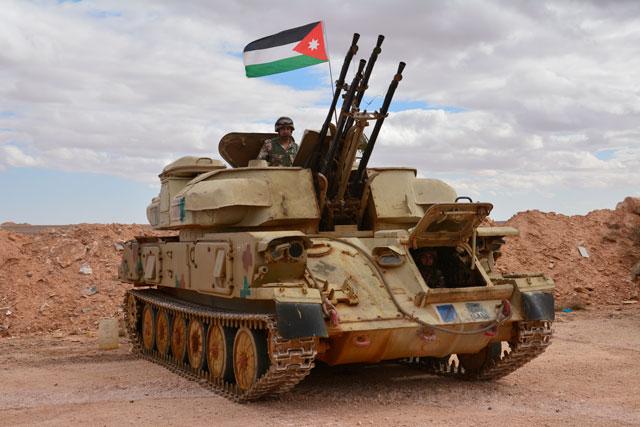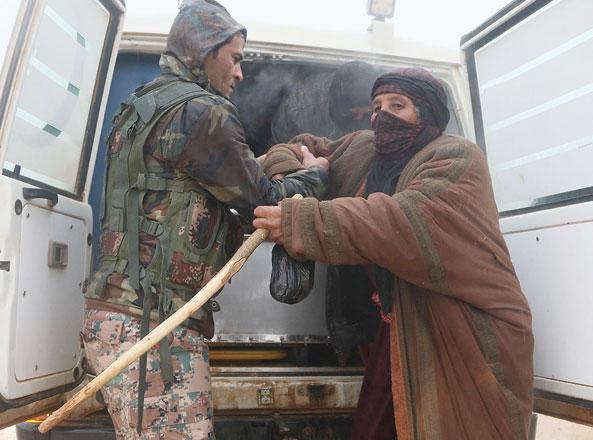You are here
Army rises to Rakban camp challenge, security threats
By Laila Azzeh - Mar 16,2017 - Last updated at Mar 16,2017

A Border Guards member is seen on the border with Syria on Tuesday (Photo by Amjad Ghsoun)
RAKBAN — In an arid land 500 kilometres from Amman lies the northeastern border with Syria, where the Rakban refugee camp emerged into existence and started to grab headlines.
A temporary home to 70,000 residents stuck on the Jordanian-Syrian border, the Jordan Armed Forces-Arab Army, along with international humanitarian agencies, are working around the clock to ensure the safety and wellbeing of the area and the refugees, enduring “very harsh circumstances.”
"It is our responsibility to protect an area that extends for 450km. We guard our borders from terrorist attacks and any infiltration or smuggling attempts, while helping stranded Syrians from the Rakban and Hadalat camps in cooperation with international relief agencies," Border Guards Commander Brig. Gen. Barakat Aqeel said.
Speaking from the service centre, which was established four months ago to provide relief services to Syrians, he underlined that the Daesh terrorist group is only three kilometres away from the camp, while some of the group’s members are suspected of hiding inside the camp.
On June 21 last year, Jordan promptly declared the northern and northeastern border areas sealed military zones, after a car bomb attack on a forward military post near Rakban camp, which was serving Syrian refugees on the northeastern front, killed seven soldiers and injured 13.
“The borders are completely closed for refugees, but we receive people with humanitarian needs; basically medical care. They are treated in the healthcare centre and sent back to where they came from,” Aqeel told reporters.
He stressed that any attempt to threaten the borders will be handled according to the military’s rules of engagement, noting that the border guards have human resources and state-of-the-art electronic systems that tightly monitor the entire borderline.
“Iraq, on the other hand, guards 170 kilometres of the Jordanian-Iraqi border, but there is absolutely no presence of the Iraqi army in the remaining 23 kilometres, which places additional burdens on us,” the commander revealed, adding that the area is considered a passageway for terrorist groups from Iraq trying to reach Syria.
Aqeel reiterated that the army coordinates with Syrian “tribal army” leaders, who serve as unofficial police, responsible for maintaining safety and security inside the camps and helping humanitarian agencies to register the refugees.
On the numbers of infiltrations, he noted that 85 infiltrations took place in 2015, involving 132 people, while in 2016, the units responded to 79 infiltrations involving 151 people. So far in 2017, the number stands at 24, in which 65 people have been involved.
“As for the number of infiltration attempts, meaning those who tried to reach the Jordanian side but failed, there were 34 cases in 2015, involving 85 people, 22 in 2016 with 45 people and 4 in 2017 with 9 people attempting to cross the border,” the army official highlighted.
Regarding smuggling cases, Aqeel said that the Border Guards foiled 33 smuggling attempts in 2015, 47 in 2016 and 8 since the start of this year, noting that the forces seized in 2015 alone a total of 878,209 palm-sized sheets of hashish, 84.672 million narcotic pills, 573 Captagon pills and 1,467 “pieces of weapons”.
“Of course, these items were seized on the border and did not enter Jordanian territory,” he underlined.
With the newly established medical centre receiving 1,037 cases so far and referring 51 people to the hospital, the officer noted that the facility deals with around 25 to 30 patients a day.
Helene Daubelcour from the UNHCR Jordan operations underlined that providing care to the people in Rakban is “not an easy task”, adding that the UN agencies operating at the service centre include UNICEF, the WFP and the UNFPA.
She explained that assistance provided by the agencies at the site includes food, water and relief assistance, while the healthcare services cover basic and reproductive health needs.
“We have provided 1,000 consultations since we opened in the site. Our operations here are one of the most challenging and we could not have managed without the support and facilitation of the Jordanian Armed Forces,” she said.
“The population here is in dire need, but we are here, as close as we can, to deliver and save lives,” Daubelcour added.
Refugees interviewed by The Jordan Times voiced their appreciation for the care they receive on the Jordanian border, but agreed that more humanitarian support is required to meet their needs back in the camp.
The second leg of the visit was the “service distribution centre”, where tens of Syrians were waiting to cross the border.
Salah Abu Odai, a member of the tribal army, said that he coordinates with the Border Guards to ensure access to medical care for people from the Syrian side.
“I escort them to the Jordanian border, where they are received by soldiers,” he told The Jordan Times.
Related Articles
AMMAN — Border Guards have human resources and an electronic system constantly updated to monitor the entire Jordanian turf and an additiona
AMMAN — Border Guards on Sunday arrested four suspects who attempted to enter Jordan from neighbouring countries and referred them to the co
AMMAN — Border Guards have not refused a sick Syrian child entry from Rakban camp into Jordan, an official from the Jordan Armed Forces-Arab
















